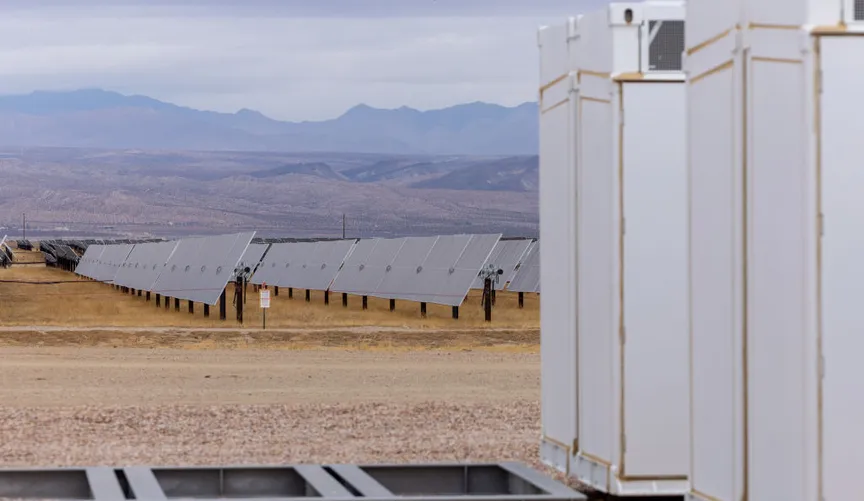
A wave of new reports and data out this week showed just how good of a year 2024 was for U.S. clean energy, especially solar and batteries. Here are a few highlights:
2025 could be another big year. The U.S. Energy Information Administration predicts solar will once again lead power plant construction and that energy storage deployment will shatter last year’s record.
But those predictions come with two major caveats: The White House and Congress.
The Trump administration has already taken direct aim at offshore wind construction and at loans that were set to support battery factories and other clean energy projects. Developers fear Congress will roll back Inflation Reduction Act investment and production tax credits, which are a major reason why clean energy deployment and manufacturing surged in the past year.
House Republicans’ budget talks haven’t yet targeted those particular incentives, and 21 GOP Congress members this week called for preserving them. Still, the IRA’s precarious position is making it hard for clean energy developers to plan ahead. As Morningstar analyst Brett Castelli put it to Heatmap, “all businesses like certainty” — and Congress and the Trump administration aren’t providing much of that these days.
Here are two more big stories from this week:
A lot is going on at the U.S. Environmental Protection Agency this week. For starters, EPA Administrator Lee Zeldin said he terminated $20 billion in federal “green bank” funds for climate nonprofits, Canary Media’s Jeff St. John reports. A judge seemed skeptical of Zeldin’s allegations of “misconduct, conflicts of interest, and potential fraud” in a Wednesday hearing.
Zeldin also announced Wednesday that he’s targeting dozens of climate and environmental regulations for rollback. Power plant and tailpipe emissions rules are among those on the chopping block, though experts say it could take years — and willing courts — for Zeldin to achieve his deregulatory dreams.
The EPA has also canceled more than 400 grants across “unnecessary programs,” Zeldin said, though he wouldn’t specify further. It all comes on top of plans to shutter the EPA’s environmental justice offices, just days after Zeldin recalled workers in those offices from administrative leave.
Energy industry leaders met this week in Houston for the annual CERAWeek conference, which turned into a celebration of all things fossil fuels. U.S. Energy Secretary Chris Wright kicked things off with a promise that the Trump administration will “end the Biden administration’s irrational, quasi-religious” climate policies, while fossil fuel executives praised President Donald Trump’s deregulatory push and announced they are stepping back from clean energy promises.
But it wasn’t all love for Trump policies. Some fossil fuel leaders quietly aired their grievances with the president’s trade fights, saying they’re driving up costs even as he tries to boost the industry.
The latest on tariffs: Ontario’s premier lifts a 25% surcharge on Canadian power exported to Michigan, Minnesota, and New York, but President Trump’s tariffs on steel and aluminum imports from the country and beyond still went into effect Wednesday. (CNN)
Climate suits safe for now: The U.S. Supreme Court declines to hear an argument by 19 Republican attorneys general seeking to limit states’ abilities to sue fossil fuel companies for climate damages. (New York Times)
It’s all about timing: Time-of-use electricity rates, which charge customers more during times of high power demand and less when it’s low, could make heat pumps more financially worthwhile in areas where fossil gas is cheaper than electricity. (Canary Media)
Dive deeper: A time-of-use rate pilot program helped Chicago-area utility customers save money, and it will soon let more residents opt in. (Canary Media)
Power plant preparations: Several states are devising tax incentives and loosening regulations to encourage power plant construction and prepare for rising electricity demand stemming from data center expansions. (Associated Press)
Sunshine State: Florida built 3 GW of utility-scale solar last year, second only to Texas, even as the state’s Republican leadership continued to fight climate action. (Canary Media)
Reliving EV history: A Chicago-area environmental justice community is reigniting its 100-year history as an electric vehicle hub by building a charging network it hopes can get more Black and Brown drivers into EVs. (Canary Media)
Smells like clean energy: A startup is adapting fusion technology to blast through rock that would destroy conventional drill bits, letting it get deeper into the Earth to unlock hotter geothermal power — and the result smells like toasted marshmallows. (Canary Media)